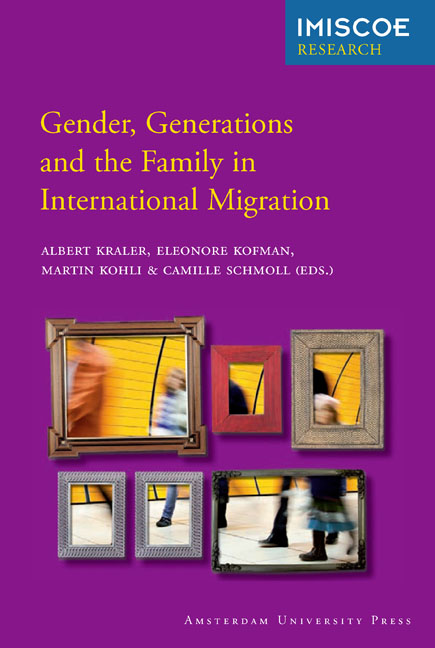Book contents
- Frontmatter
- Contents
- Preface
- 1 Introduction: Issues and Debates on Family-Related Migration and the Migrant Family: A European Perspective
- Section I The Family as a Moral and Social Order
- Section II Gender, Generation and Work in the Migrant Family
- Section III Marriage Migration and Gender Relations
- Section IV Transnational Family Lives and Practices
- List of Contributors
- Index
- Other IMISCOE titles
2 - Sex and the Regulation of Belonging: Dutch Family Migration Policies in the Context of Changing Family Norms
Published online by Cambridge University Press: 21 January 2021
- Frontmatter
- Contents
- Preface
- 1 Introduction: Issues and Debates on Family-Related Migration and the Migrant Family: A European Perspective
- Section I The Family as a Moral and Social Order
- Section II Gender, Generation and Work in the Migrant Family
- Section III Marriage Migration and Gender Relations
- Section IV Transnational Family Lives and Practices
- List of Contributors
- Index
- Other IMISCOE titles
Summary
Introduction
In recent years, the Netherlands has drawn international attention by requiring that family migrants originating from less industrially developed nations in Africa, Asia and South America pass a Dutch language and integration test in their countries of origin, before they can be admitted into the country.
When defending these policies before Dutch Parliament, former Minister for Immigration and Integration Affairs Rita Verdonk linked assumed differences between Dutch norms regarding family relations and sexuality and those of ‘non-Western’ migrants to perceived threats to the stability of Dutch society as a whole. In her words:
failed integration can lead to marginalisation and segregation as a result of which people can turn their back on society and fall back on antiquated norms and values, making them susceptible to the influence of a small group inclined to extremism and terrorism … Ongoing radicalisation implies the real risk that non-integrated aliens will take an anti-Western stance and will assail fundamental values and norms generally accepted in Western Society such as equality of men and women, non-discrimination of homosexuals and freedom of expression.
In the context of a debate concerning family migration from ‘non-Western’ nations, the message is clear. Unless these family migrants can be screened for the proper norms, values and skills before being granted entry, they will form a threat to the Dutch nation. Given its selective bias, this particular aspect of Dutch family migration policies has been dubbed racist by its opponents. In more general terms, Dutch family migration policies have been compared to the racist policies that used to distinguish the rulers from the ruled in the former colony of the Dutch East Indies (De Hart 2003a).
To my mind, one should be careful when drawing such parallels. There is danger in depicting the present as an automatic sequel to a racist past. A significant period of European history following the Second World War, namely, that of decolonisation and the rejection of racist ideology, risks being brushed aside as atypical, while an important legacy of that period – the equal rights of all citizens of the European Union, regardless of their race, creed or ethnic background – risks losing the attention and activism that it needs in order to survive as a vital element of European politics.
- Type
- Chapter
- Information
- Publisher: Amsterdam University PressPrint publication year: 2012



